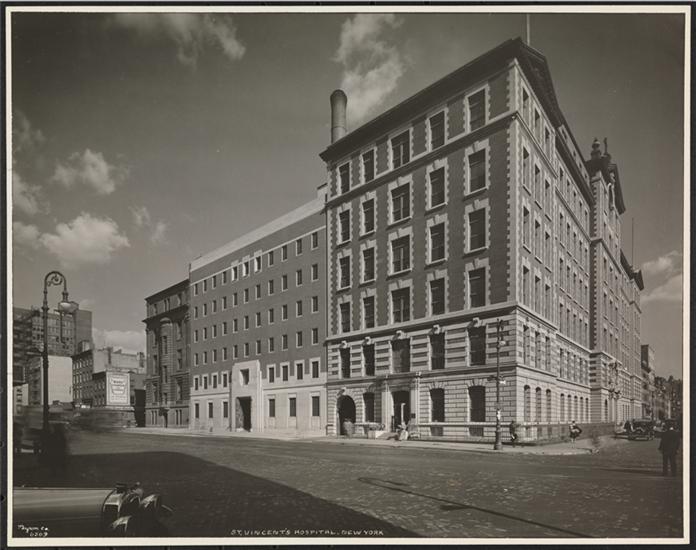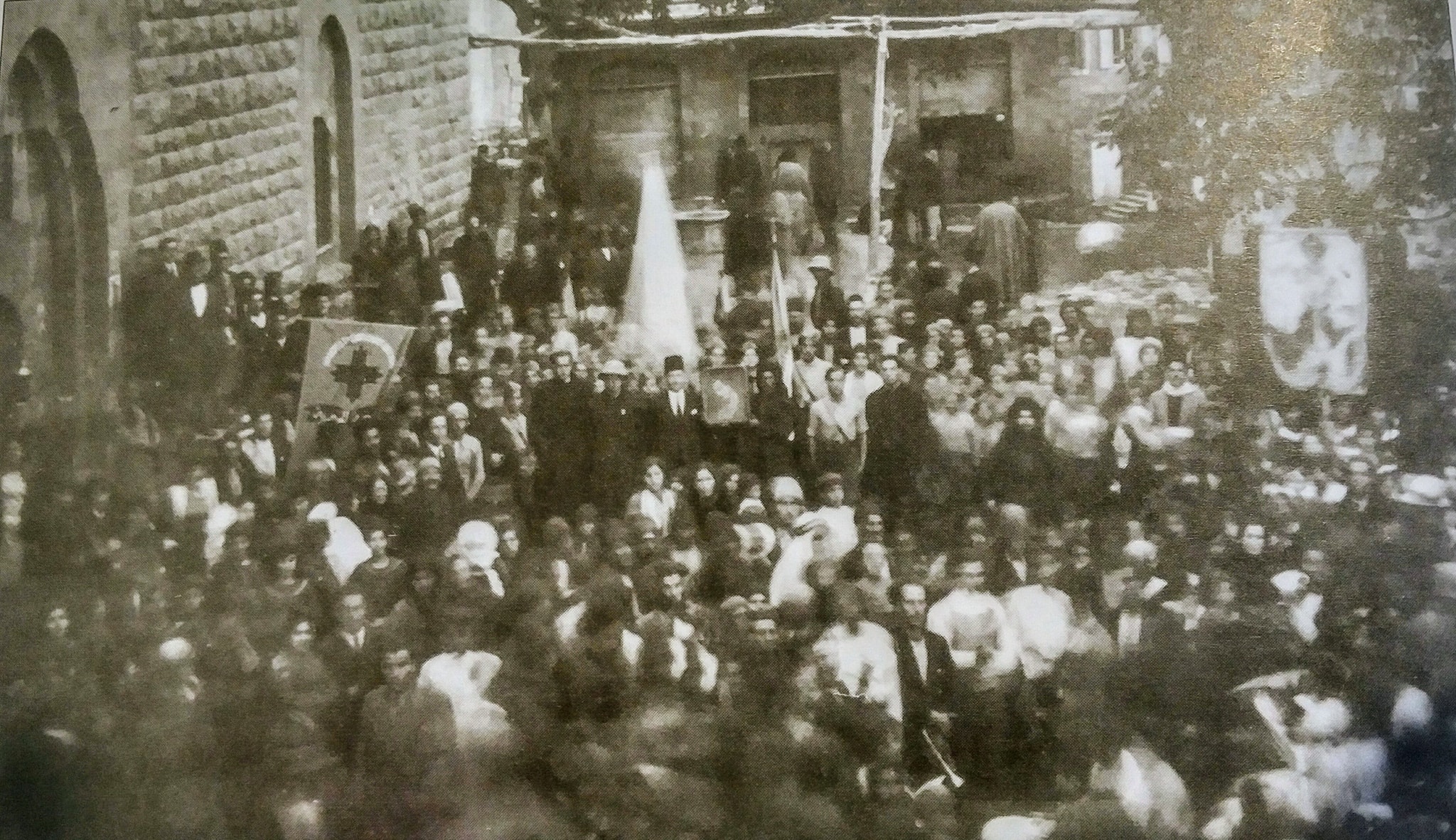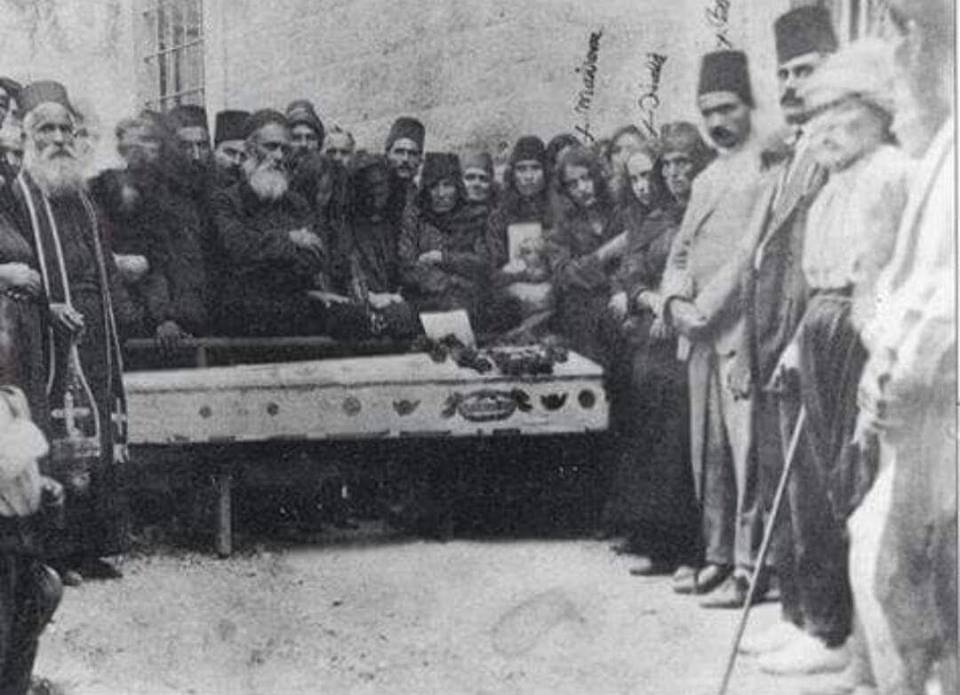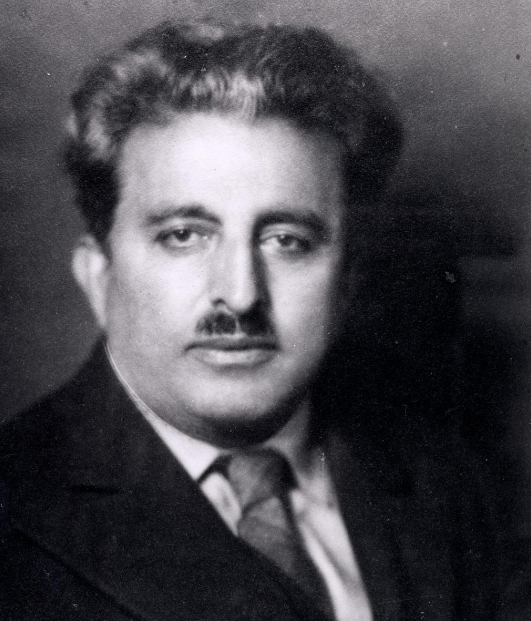Introduction by Glen Kalem-Habib and Francesco Medici
Transcription of the original Arabic poem by Nadine Najem
Translation into English by Naji B. Oueijan

Ninety years ago today on the 10th of April 1931, Kahlil Gibran passed away at St Vincent’s Hospital in New York City around 11 pm. His official cause of death was noted as ‘cirrhosis’ of the liver and some traces of ‘tuberculosis’. Aside from his Boston funeral proceeding, Gibran willed that his body is to be buried in his native town of Bisharri in Mt Lebanon. It took a further three months before his body and his belongings finally arrived in Beirut on the morning of August 21st of the same year. Greeted by thousands of mourners, the day was marked with many coming to pay their respects to Lebanon’s most prized and celebrated son. Archibald Clinton Harte, an American traveler who attended, reported that the day and the days proceeding to Gibran's final resting place were more like a 'triumphal' return ...'a joyous kind of funeral that one thinks one would like'.
Starting with a guard of honor around the casket, it was proceeded with the minister of education solemnly pinning the decoration of fine arts on the poet’s breast.
 In the procession, towards the magnificent cathedral of St. George, representatives from the high commissariat, the French admiralty, were followed by the religious representatives of Greater Lebanon. Members of the Shi‘ite and Sunni Muslims, Greek and Syrian Catholics, Orthodox, Maronites, Jews, Jesuits, Protestants, Druzes, Armenians, and crowds of children had come from all over Lebanon.
In the procession, towards the magnificent cathedral of St. George, representatives from the high commissariat, the French admiralty, were followed by the religious representatives of Greater Lebanon. Members of the Shi‘ite and Sunni Muslims, Greek and Syrian Catholics, Orthodox, Maronites, Jews, Jesuits, Protestants, Druzes, Armenians, and crowds of children had come from all over Lebanon.

That evening Charles Dabbas, president of the Republic, officiated at a governmental reception where among others, was Gibran’s one-time mentor, Ameen Rihani. That evening he gave a moving speech, coupled with a composed poem aptly named: Akhi wa Rafiqi Jubran (Gibran, My Brother, and Companion) or simply still, Ila Jubran (To Gibran).
The poem, published in Rihani’s posthumous Arabic collection Hutaf al-Awdiyyah: Shiʻr Manthur (Hymn of the Valleys: Prose Poems, Beirut, 1955, pp. 123-136), may be considered as the last letter written by Ameen to Kahlil.

On the occasion of the 90th anniversary of the poet’s death, here below are a transcription by Nadine Najem of Rihani’s original Arabic poem, with an English translation by Naji B. Oueijan (cf. A. Rihani, Hymns of the Valleys, translated with an introduction and annotations by N.B. Oueijan, Piscataway, NJ, USA: Gorgias Press, 2002, pp. 90-96).
To Gibran
Seems it a day in Lebanon
Whose secrets are to man untied,
One of those hours which smoothly glide
Like a bird in the silent dawn;
A remarkable rebirth it seems to be
At the alley of the valley,
Where hearts and dreams sweetly lingered,
Where the daybreak meekly whispered,
The clouds cleared, and the night slumbered,
And the hills glittered.
In Lebanon, his spirit blows again
Blackberries under a high rock,
All overspread their coral hue;
And at its foot, the laurel grew,
Terebinth and inula viscosa crowded,
And the crimson tulip sparkled;
Whereupon the voice of time proclaimed
A long and doleful night now sways
‘Twixt each and all the wakeful rays.
And the voice of generations said:
“My plants and seeds would bloom
In death and life, in bright and gloom,
For the noble news;
In Lebanon, his spirit blows again.”
And at the cradle of prophecies,
Around the pilgrims’ sanctuaries,
Where rests the sacred valley
Beneath the Cedar’s boughs,
Where days, hymns of praise, chanted,
Time stood, with reverence thrilled,
While poetry’s brides from incensed valleys
Advanced with cups of ivory
Teeming Time’s distilled potion;
And the brides of imagination
Came from the moistened prairies
Wearing thornless crowns of roses
And blackberries in coral clusters.
In the shade of alleys, the greeters’
Cheerful voices softer sounded
Than silk by wind caressed.
And from the brooks, voices
Of electric grating iron motors,
Of revolutions whose waters
From the mountain heights would flow
Where violets, under the snow,
Slumbered like babies;
And from those heights came shepherds
Praising the Lord’s might
For his spirit, in Lebanon, blows again.
And on the Mediterranean coast,
Between old Byblos and the headland post
Where the river embraces the breaking waves
I saw three women Eastward gaze,
And the sun, like pomegranate flower,
Rose from beyond the snowy bower.
One of them in black was dressed,
Her smiling lips, derision kissed;
Another female in full white wear,
Her wet eyes told of real despair;
The third one pulling her purple hue,
But in her breast the flame of desire blew.
The three, moaned July and bid the dawn:
“Has he? Has he returned home?”
And from the mountains of Judas,
Responded the lyre of David,
Whose hymn, them, delighted.
And from the meadows of Galilee,
Voices told of the Great Nazarene.
And from the Jordan valley a voice
Uttered the names of Armeya
And Ashi’ya bin Amos;
And in the oasis the dove chanted;
Of Ibn Rabiah,
And of Mejnoun the bulbul warbled.
And from the kingdom of al-Gizat,
A voice of one high ranking
Was heard saying:
“Each voice is heard in its domain.”
And like the radio catches the voice waves,
The immortal voices Gibran caught;
Those voices echoed
The history, literature, and doctrines of the East.
And though he bid his country farewell,
He could not leave his heritage
Which he carried beyond the seas.
Distance glorified his good deeds and his memories
And nourished the beauty of the voices he heard.
The clanging church bells in Lebanon he adored,
And the melodies of the Oud and of the pipes he devoured.
In the valleys and the Cedar shade his imagination roamed;
And at the silver brooks, writing, he paused
And dreamed of dreams of ebony and gold.
He left, but he did not depart.
His country, he carried in his heart.
And before his genius matured,
His heavy load abroad, endured.
Enslaved by his ambitious soul,
He throve for knowledge and for all,
Though new passions soothed not his soul;
Gibran stood firm though no more
Could his feet touch the soil of his country,
Which alone he sought to carry,
Except in moments of consummation and dreams.
In Paris, city of the lights, I met him
Greeting its nights, his lamp-light dim.
I saw the girls of July – the females of imagination –
Wandering around him, American companions and Parisian,
To merge in his joy, love, and derision.
The one in white would open wide
The doors which art and beauty hide;
The one in black would turn his heart’s folder
To fold its pages with her soft, cold finger.
The one in purple scarf would stand
Between the others two, her hand
The glass emptied, and to her lipstick turned.
A source of beauty and art was his wakeful spirit;
Perception was its visionary merit;
The museums and cabarets,
The gardens and the cafés,
Were to him inspiring companions,
And partners of joy and splendor,
And representatives of woe and glamour.
His soul became more enthusiastic
As it perceived the rootlet of taste artistic;
It became more thirsty the more it quenched,
More fiery, the more it searched.
You bade Paris farewell, but you never left;
The heritage of France
And that of the East you carried
To a city with glory recently honored,
To a city in the new world, whose heart is of iron.
There, amidst the frightful and deafening noises,
Where slaughtered are humble voices,
Where even great passions become breathless
In the heart of the current restless,
Which enslaves the business moguls
In the shades of sky-scrapers.
A city where electricity the sun replaces.
There in the city of iron and gold,
In the city where man wears time and a scale holds,
In the city which enumerates and measures all,
There in New York, lived he who could not compute;
The measurements and scales, would refute.
In a hall anointed by a great zeal,
The effort of the soul striving to feel
Ultimate justice and ideal beauty.
In this hall which turned into a haven
Of thought, art, and imagination,
Until by its walls it concealed both
The East and the West;
And the window overlooking the North,
Carried in its radiant light
The pole’s rough, energizing sight.
There in this humble hermitage, dim and bright
There in the cradle of compassion and encounter,
And amidst statues, pictures, books and paper,
Amidst the wreckage of pages,
Where thought and wisdom competed,
Amidst small pearls by thorns supported,
And pictures upon which his brush wandered,
Amidst sacred toys,
Church candles and symbolical drawings,
There, this hermitage was overflowing
With artifacts, literature, and spiritual schemes,
Lived Gibran for twenty years.
There he struggled against the elements,
His spirit, reason and heart contested;
His armor was two swords:
One of the East,
And another from the West;
He gave one what his heart offered,
And the other with his mind and spirit colored.
Both Arabic and English he encountered
And tamed them to express his mind and imagination.
Yes! Ten years of constant struggle and confrontation,
Doing what is right,
Ten years of disrupting struggle,
And ten of calm and light;
Over the mind, in Arabic, he triumphed;
And the heart, in English, he mastered.
By his Arabic imagination,
The facts of life Gibran unveiled;
And in English, above imagination he reigned.
He was a genius, as a writer and sage.
His words were heard in nations, which in rage
Towards the East their deaf ears turned.
His wisdom was learned by those who matured
Around the cradle of wisdom, and on its thrones ruled.
And amongst them, Gibran had his brazier and throne.
The three females around his throne I could spy –
The females of New York and July.
They came in a vision with reality dazed,
Or reality with a vision glazed.
I heard them reciting poetry, and incense burning,
The pages of the immortal book, I saw them turning;
That was the book of passion and of wings broken.
Around his coffin I saw their light
And heard them asking the night:
“Will he ever return? Will he?”
July, David, Ishaya,
Al-Farid, the Madman, and William Blake
Let them wonder! Let them wonder!
Gibran, my brother and companion!
Nothing has ever made me more gloomy
Than your final return to Lebanon.
May Death do justice to both of us,
Between the one, who back home often returned,
And the one on whom deprivation’s agony prevailed.
My eyes and heart, I would have given you;
Thus you may see what, in you, now we view.
Gibran, my brother and companion!
Fame has its time; sadness has its own;
And what remains belongs to Lebanon,
To this dear, generous, and tender mountain,
Which holds you today and will maintain
What of me tomorrow remains.
Whatever the message we carried to the East and to the West,
Time will ever acknowledge our best.
And whatever for our fellow men we created,
The future will give us justice when my dust
In the valley of Al-Freike will rest
And call yours in the sacred valley.
Then from the pine that will shade my grave
The breeze will carry my fragrant kisses to your cave,
Which the Cedar will forever shade.
هو يومٌ من الأيام في لبنان جَهِلَ الإنسان السرَّ فيه
هي ساعاتٌ من الساعات مرّت مرور القبَّرة في سكينة الفجر
هي يقظةٌ عنصرية عند مُنعطف الوادي
وقد هجعتْ فيه القلوب والأحلام
فهمس الفجر، وتناءب الليل
وإنقشعَ السَحاب، فتلألأت الربى.
إن روحاً تستيقظُ في لبنان
***
تحت صخرة شماء، نثر العلّيق مرجانه
وأثمر الغار فوقها، وتزاحم عند قدميها البطم والطيون
نوَّرت الزنبقة الخمرية
سُمعَ إذ ذاك صوت الزمان يقول
أن بين كل يقظة ويقظة ليلاً طويلاً عقيما
وسُمعَ صوت الأجيال يقول
في الفناء وفي البقاء
كما في الظلمة والضياء
تثمر أغراسي
إنه لنبأ كريم، إن روحاً تستيقظ في لبنان.
***
في الوادي المقدّس، تحت ظلال الأرز
هتفَتْ الأيام تمجيداً
عند مهد النبوة، وحول مناسك العُبَّاد
وقف الزمان خاشعاً محبورا
جاءت من الأودية الشذية عرائس الشعر
يحملن كؤوساً من العاج، فيها طيب قطَرته الدهور
وجاءت من المروج الندية عرائس الخيال
يضفرن إكليلاً من الورد توارت أشواكه
ومن العلّيق وقد إختفت بين أوراقه عناقيدُ المرجان
وسُمعت في فيئات الربى أصوات كالدمقس
إذا لاعبته الرياح.
هي أصوات المرحّبات، أصوات الجَذَل
وسُمعت عند السواقي أصواتُ كالحديد
إذ سيرته الكهرباء
هي أصوات الهادمات، أصوات التمرّد
من أعالي الجبال، التي يرقد تحت ثلجها البنفسج رقدة
الأطفال، جاء الرعاة يسبّحون
إن روحاً تستيقظُ في لبنان.
***
على شاطئ البحر الأبيض، بين مصبّ النهر وجبيل
رأيت نِسوة ثلاثاً يتطلعن إلى المشرق
والشمس، كالجِلنار، تنبثِقُ من ثلج يكلل الجبل
إمرأةً في ثوب أسود
وقد قبَّل التهكّم فمَها الباسم
وإمرأة في جلبات أبيض
وقد نطق الحنان في عينها الدامعة
وإمرأة ترفل بالأرجوان
وفي صدرها للشهوات نار تتأجج
ثلاث نسوة يندُبن تموز، ويسألن الفجرَ قائلات
هل عاد يا تُرى، هل عاد!
من جبال يهوذا أجابتهن قيثارة داود
وأبهَجَهُن صوت صاحب النشيد
من مروج الجليل سمعن صوتاً يهمس بإسم الناصري العظيم
ومن وادي الأردن صوتاً يردد إسميَّ إرميا
وأشعيا بن آموص.
وفي البداية شدتِ الورقاء
وتغنّى الحادي بذكر المجنون وإبن أبي ربيعة
من معرّة النعمان، من السدة العلائية
جاءَ خاتم الأصوات يقول:
" لكل صوت مجال في مسامِعهِ "
مثلما يتلقف الراديو الأصوات المنتشرة في الفضاء
هكذا تلقَف جبران الأصوات الخالدة
في تاريخ هذا الشرق وفي آدابهِ وأديانهِ
سمِع، ووعى، وأذكر
ثم ودّع، وما هجر
***
حمل الإرث القديم إلى ما وراء البحار
فزاد البعد صدى الأصوات جمالا
وزادت الغربة المآثر والذكريات جلالا
ظل يسمع أجراس الكنائس في لبنان
وظل يطرب لرنّات العود، وغُنات القصب
دامت المخيلة منه تهيم في الأودية، وترقد في ظلال الأرز
وإستمر يصوغ، عند السواقي الفضية
أحلاماً من الأبنوس والذهب
رحل، وما هجر
حمل الوطن في قلبهِ
وقبل أن ينضج النبوغ كان الحمل في الغربة ثقيلا
كان قيداً لنفس طماحة مكدّة
ما كان ليُغنيه عن العلم، أو يؤاسيه في غمرات
الأشواق الجديدة.
كان جبران ثابت القدَم في أرضٍ لم تعد تحت قدميه
أرضٍ حملها بين جنبيه
وحيداً إلا في ساعات الأحلام والإبداع.
***
رأيته في باريس، مدينة النور
يحيي الليالي على نور سراجٍ ضئيل
ورأيتُ بنات تموز - نسوة الخيال -
يطُفن جوله في سميرات باريسيات
ورفيقات أميركيات
يَزِدنَه بهجة وشوقاً وألماً ووجدا
البيضاء الجلباب، تفتح له أبواب الفن والجمال
والسوداء الثوب، تقلب صفحات قلبه وتطويها بأنامل
ناعمة باردة
والأرجوانية الوشاح تقف بين الإثنين
وقد أفرغت الكأس، وعمدت إلى المرآة والقلم القرمزي
وكانت الروح المستيقظة
ترد موارد الفن والجمال محفوفة بالأطياف
في المتاحف والملاهي
في البساتين والحانات
كنَّ للرفيق الرفيقات المتباريات
بل كنَّ الشريكات بما تجسّد من حبور وروعة
وما تجسم من ألم وأسى
كانت روح الرفيق تزداد شوقاً ووجدا
في ورودها الموارد الذوقية والفنيّة
تزداد ظمأ كلما شربت، تزداد إحتراقاً كلما إرتوت
فودعتْ باريس، وما هجرتها
حملت الإرث الفرنسي طي الإرث الشرقي
إلى مدينة حديثة المجد
مدينةٍ في العالم الجديد، قلبها من حديد.
***
هناك بين عجيج يروّع، وضجيج يُصمَّ
حيث تُذبح الأصوات الوديعة
وتختنق الأشواق العالية
في قلب التيار القهار
المبدع المستبعد جبابرة العمل
في ظلالٍ لناطحات السحاب
تستعيضُ عن الشمس بالكهرباء
هناك في مدينة الحديد والذهب
في مدينة الإنسان الحامل الساعة والميزان
في المدينة التي تحصي كل شيء
وتزن وتقبس كل شيء
هناك في نيويورك أقام من لا يحسن العد
ولا يحترم المقاييس والموازين.
***
في ردهة قدسها الجهاد الأكبر
جهاد الروح في سبيل الحق المطلق، والجمال الأتم
فقدت الردهة صومعة للفكر والفن والخيال
حجبت بحجارتها الشرق والغرب
وفتحت شباكاً للشمال
فحمل القطب إليها مع نورهِ السويّ
روحه الخشنة المنشطة
هناك في تلك الصومعة الوديعة
القاتمة المحيا اللآمعة
موطن العطف والترحاب.
بين الكتب والأوراق والصور والتحف والتماثيل
بين رُكام من صفحات تزاحمت فيها الفكَر والحِكَم
ومن شذرات تناءبت تحتها الأشواق والأشجان
ومن لوحات جالت فيها الريشة جولات كليلة
بين دمى قدسية، ورسوم رمزية
وشموع على مائدة كنيسة
هناك في تلك الصومعة الحافلة بالآثار الذوقية
والفنّية الأدبية، وبالألآعيب الروحية
أقام حبران عشرين سنة
هناك صارع العناصر التي كانت تتنازع فيه
الروح والعقل والفؤاد
وكان سلاحهُ سيفين من الشرق ومن الغرب
فشحَذَ الواحد على تصلب من قلبه
وصقَلَ الثاني بذوب العقل والروح
لغة العرب ولغة الإنكليز.
جاهد كلتيهما وذللهما لبيانه وخياله
عشر سنوات من الجهاد، وعشرٌ من حسن الثواب
عشر سنوات مضطربة، وعشر مطمئنة مثمرة
فإنتصر بالعربية على العقل
وإنتصر بالإنكليزية على القلب
***
إستعاذ جبران بخياله العربي من حقائق الحياة
وسما ببيانه الإنكليزي فوق الخيال
وكان في الحالين مبدعاً، طوراً إنشاءً، وتارة فكرا
فسمعتْ كلماته أممٌ تضن بسمعها على الشرق
وردد حكمته من نشأوا، ومن نشأن
حول مهد الحكمة هناك
وجلسوا وجلسن بعد ذلك على عروشها
وأمسى جبران ذا عرش بينهم، وذا مجمرة بينهن.
رأيت حول العرش النسوة الثلاثاء
نسوة تموز في نسوة نيويورك
خيالاً في حقيقة، وحقيقة في خيال
وسمعتهن يتناشدن الشعر، ويحرقن الند
ويقلّبن صفحات الكتاب الخالد
كتاب الأشواق المكسّرة الأجنحة
ثم رأيتهن حول النعش
وسمعتهن يحدثن الليل ويسألنه قائلات
هل يعود، يا ترى، هل يعود!
تموز وداود وأشعيا
والفارض والمجنون ووليم بْلـَيـْك
دعهن يتساءلن، ودعهم يتساءلون
***
أخي ورفيقي جبران
ما أحزنني شيء في حياتك وجهادك
مثلما تحزنني هذه العودة منك
عودتك الأخيرة إلى لبنان
فحبذا الموت يَعدلُ بيننا
بين من تعددت عوداته
ومن تكررت فيه لوعة الحرمان
ولأعطيتك لو إستطعت عينيَّ وقلبي
لترى الآن ما نراه عنك وفيك.
جبران أخي ورفيقي
إن للشهرة يوماً، وإن للحزن يوماً، والباقي للبنان
لهذا الجبل العزيز الكريم الحنون الذي يضمّك اليوم
وغداً يضمني، إليه
ومهما يكن من رسالة حملناها إلى الشرق والغرب
ينصفِ الزمان
ومهما يكن، من أدب أبدعناه رأفة بالناس
يعدلِ المستقبل
إن ترابي غداً في وادي الفريكة يناجي ترابك
في الوادي المقدس.
من الصنوبر الذي يظلل ضريحي
سيحمل النسيم قبلات عطرة
إلى ضريحكَ في ظلال الأرز.